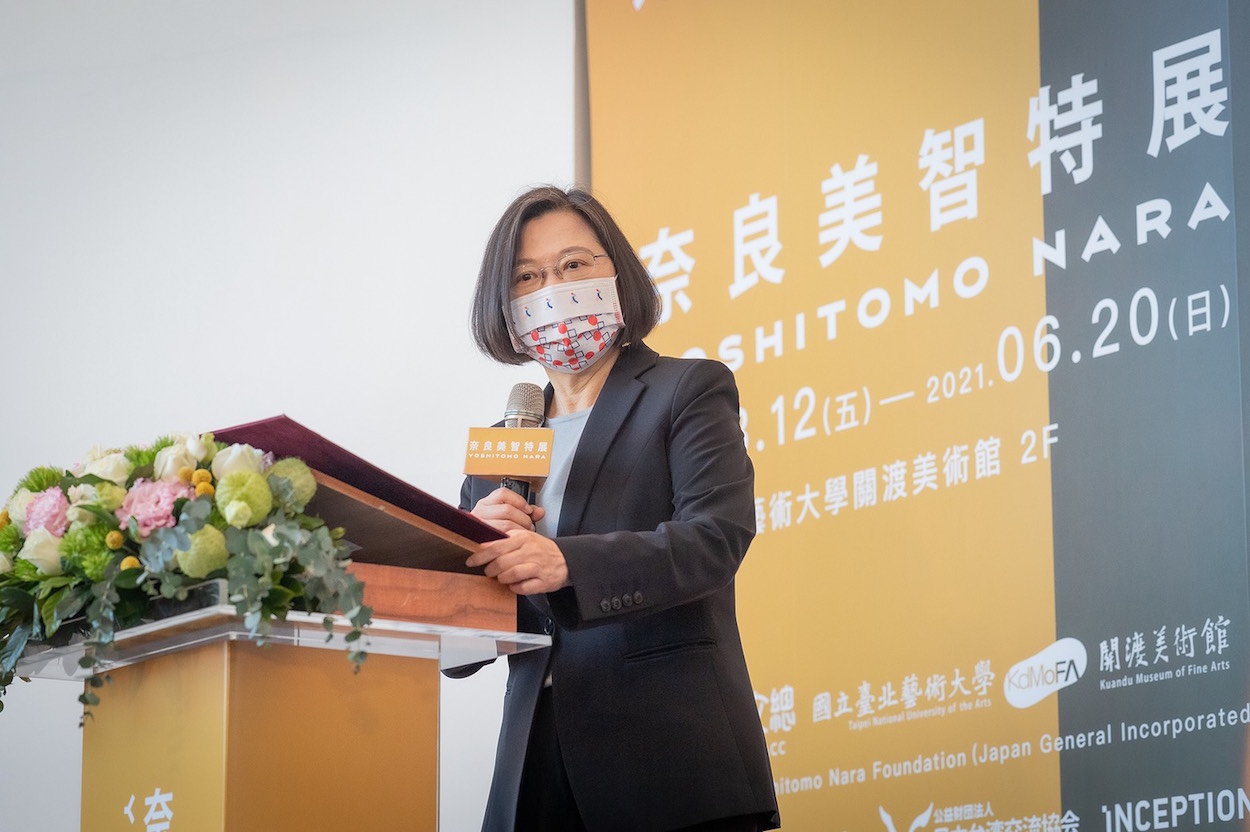by Brian Hioe
語言:
English
Photo Credit: Tsai Ing-wen/Facebook
TAIWAN BEGAN COVID-19 vaccinations on Monday, with 44,500 doses of the AstraZeneca vaccine distributed to 57 hospitals. Vaccination begins shortly after the 1,000th confirmed case of COVID-19 in Taiwan. Taiwan received its first batch of vaccines, 116,500 doses of the AstraZeneca vaccine, earlier this month.
Premier Su Tseng-chang and Minister of Health Chen Shih-chung were the first to receive the vaccine, in a move aimed at demonstrating that the vaccine is safe. Su and Chen received the vaccines to allay fears that the AstraZeneca vaccine is unsafe. Some countries halted distribution of the AstraZeneca vaccine due to concerns that it has side effects that could lead to blood clots, though distribution of the AstraZeneca vaccine has resumed in European Union countries.
 Premier Su Tseng-chang (center). Photo credit: Su Tseng-chang/Facebook
Premier Su Tseng-chang (center). Photo credit: Su Tseng-chang/Facebook
When asked whether President Tsai Ing-wen will also receive the vaccine, a Presidential Office spokesperson stated that while considerations are up to Tsai’s medical team, it would be more significant for Tsai to receive a domestically produced COVID-19 vaccine. With delays in vaccine delivery to Taiwan criticized as a fault of the Tsai administration by the KMT, this has led the Tsai administration to emphasize that domestically-produced COVID-19 vaccines could make up the shortfall. However, the timeframe for the completion of phase 3 testing for domestically-produced COVID-19 is still unknown.
Medical personnel are to receive priority in receiving the vaccine, due to the fact that medical personnel could become infected with COVID-19 while treating patients. Taiwan’s largest cluster to date during the course of the pandemic, which occurred in January and February at the Taoyuan General Hospital, took place due to medical personnel involved in treating patients with COVID-19 becoming infected. As a result, nearly 5,000 individuals who worked at the hospital or who had visited the hospital had to be quarantined.
After medical personnel, the next group to receive vaccines will be individuals whose occupations place them at greater risk of exposure. This includes people working in the airline industry. In December, Taiwan’s first case of domestic transmission of COVID-19 in 253 days occurred because a pilot that violated quarantine caused a flight attendant to become infected with COVID-19. Athletes that qualify to participate in the Tokyo 2020 Olympics and, consequently, will need to travel to compete, are also eligible to receive the vaccine.
But with vaccinations beginning in Taiwan, it is probable that the Central Epidemic Command Center (CECC), will increasingly have to deal with vaccine-related disinformation going forward, much as it has dealt with disinformation regarding the spread of COVID-19 through the course of the pandemic. The CECC coordinates Taiwan’s response to COVID-19.
One can see early signs of this with the CECC having to respond to rumors that the government would not distribute all available vaccines before they expire. Likewise, the Tsai administration has also had to respond to media reports that it intended to transfer two million AstraZeneca vaccines to Paraguay. Paraguay is Taiwan’s only remaining diplomatic ally in South America and is currently in the throes of an unchecked pandemic, with 192,599 cases of COVID-19 as of Monday, and 3,695 deaths.
Nevertheless, the Tsai administration has stated that it has agreed that aid slated for Paraguay could go to purchasing vaccines. The Tsai administration has also criticized the fact that some vaccine suppliers have asked Paraguay to break ties with Taiwan as a precondition to purchasing Chinese-produced vaccines such as the Sinovac vaccine.
 President Tsai Ing-wen. Photo credit: Tsai Ing-wen/Facebook
President Tsai Ing-wen. Photo credit: Tsai Ing-wen/Facebook
It is highly possible that China will adopt a similar strategy regarding other diplomatic allies of Taiwan, making breaking ties with Taiwan a precondition of receiving vaccines. Much as how China has offered vaccines to countries as a means of expanding influence, so, too, may the Chinese government deny access to vaccines as a form of coercion.
In the meantime, the timeline for other vaccines that the Tsai administration has purchased to arrive in Taiwan, such as the BioNTech vaccine and Moderna vaccine, is still unknown. It is probable that the KMT and members of the pan-Blue camp will, as before, leverage on delays to attack the Tsai administration. The Tsai administration will also likely have to respond to misinformation and disinformation regarding the reason for vaccine delays.

